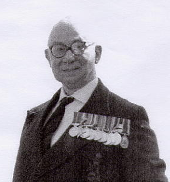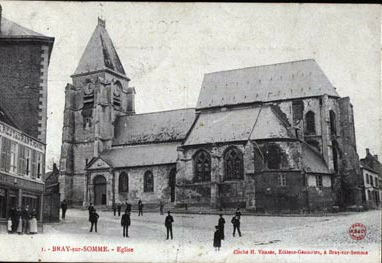



The Parish Church of St George the Martyr, Waterlooville

Summer 2015
Diaries of a First World War Bugler
9th SEPTEMBER 1915.
Now the Company are in the trenches and today our Company Commander, Captain Holmes, was in front of the trenches sketching the enemies’ positi1st DECEMBER 1915 arrives and with it a rumour that the war will be over by Christmas so roll on that festivity!
6th DECEMBER 1915.
Nothing out of the ordinary has happened lately and today and we still wonder if this war will be over by Christmas or not. I have mentioned before that the buglers have a permanent billet in Bray as we are doing the aerial guard and we were very thankful indeed as we intend to make the most of Christmas as possible
24th DECEMBER 1915.
Up till today things have been about the same. This being Christmas Eve we are rather busy preparing the feast. Our billet is a picture, nicely decorated with the decorations sent by my Dad and Ma. We have bought in all that is necessary. I might add that the German artillery have been shelling us again very heavily. I fully expect a repetition tomorrow.
25th DECEMBER 1915.
CHRISTMAS DAY.
At last the great day has arrived. I cannot help but think of my doings and hardships since Christmas 1913. This morning was spent putting the finishing touches on everything.
At 1 o’clock the buglers marked out a course for the Divisional Cross Country Run. Returning to our billet at 3.o’clock we found everything ready for us. A long table was down the middle of the room upon which were the following:-

To mark the 100th anniversary of the outbreak of World War I, we are continuing the serialisation of the diaries of Bugler John McCormack -
25th NOVEMBER 1915.
The following day, the Buglers had a very narrow escape. Three enemy aircraft made a raid on our village. Bombs were dropped right over our heads but luckily a strong wind was blowing at the time and the bombs dropped on the village railway station some 250 yards to our right. The lines were damaged but that was all.
26th NOVEMBER 1915.
Next day our airmen's turn came. 14 of them flew over the German lines early in the morning doing a lot of damage and in the afternoon 7 Naval planes went right along the Germans' trenches and played hell with them.
The usual fighting still goes on but I believe we are preparing for the final as towards 6 o’clock on the evening of the 26th up till the end of November, big Naval 12 inch guns have been arriving.
At 8 o’clock the piano arrived. This was secured from a distant house after a lot of trouble. The fun commenced. Just as I had finished a song strains of music were heard in our little garden. It was the prize bugle band of the 2nd King's Own Yorkshire Light Infantry giving selections. We afterwards invited them in. Just think of it, 45 in a room for sixteen of us!
26th DECEMBER 1915. BOXING DAY was very quiet.
31st DECEMBER 1915.
The last day of 1915 has arrived and as the clock of the church in Bray (1722) chimed twelve we all made our resolutions and sang ‘Should Old Acquaintance’ .
1st JANUARY 19l6.
Things are very much the same. We had a heavy artillery duel and this was repeated on the 2nd and 3rd. Now comes the memorable
4th JANUARY 1916.
We overslept ourselves. It was half past eight and we awoke with a start for the German artillery were shelling us. Two had just dropped into the Royal Engineers' billet 100 yards down the road, killing 5 and wounding 13. “Up you get, boys,” we all sat up in bed when -
There I left them. The shells were still coming over as I walked down to the hospital. There the blood was washed from my face. I was then inoculated and my head bandaged up. I attended hospital three times a day for hot fomentations. After three days they succeeded in getting three pieces of shell and a piece of glass out of my face.
10th JANUARY 1916.
Today I am feeling quite myself again and my wound is going on fine. The hole in our garden was about 5 feet across and 4 feet deep. As we are going on rest, the first we have had for 14 months, we were relieved by the Wilts Regiment. We are all packed up ready to move tomorrow.
11th JANUARY 1916.
Leaving Bray, the battalion, with the bugles in the centre, had a night march to a place called Sailly Laurette. Here we stayed for some time training in various ways. It was while we were here that a big attack was made by the Germans at Carnoy. Our 5th Divisional R.F.A. had to go into action, poor beggars; this is supposed to be their rest.
To be continued
Bray-
